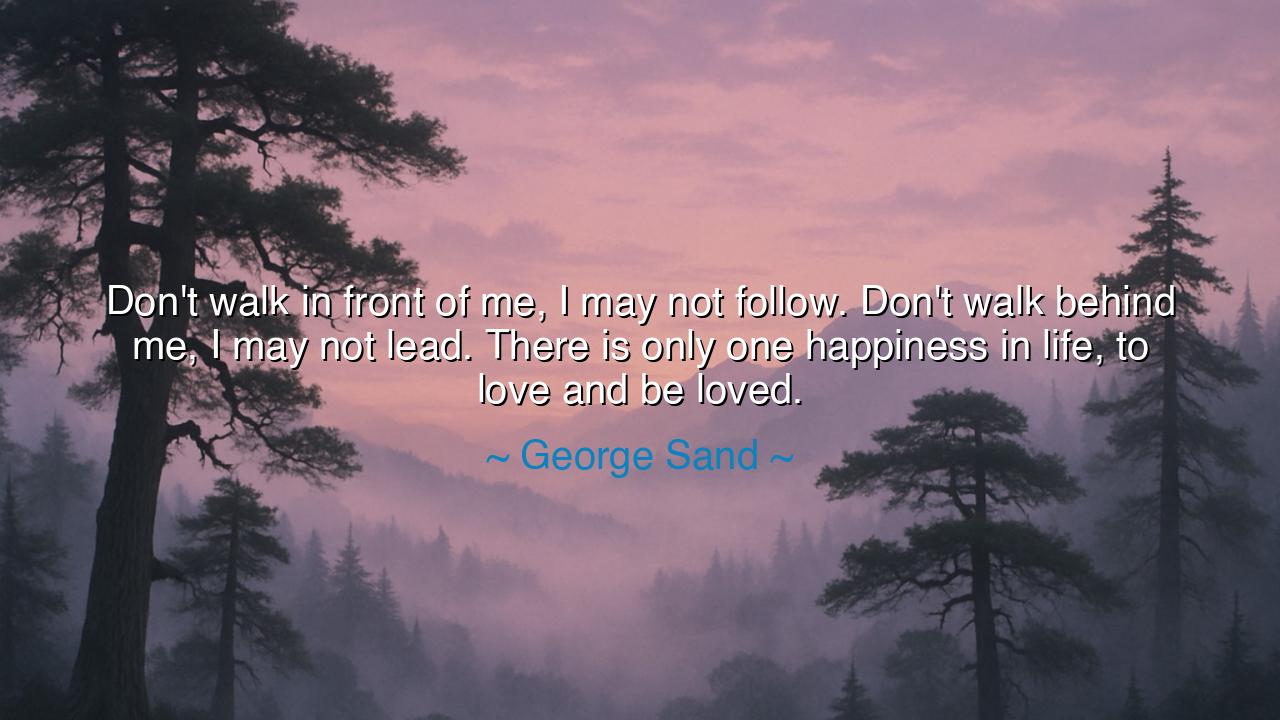
Don't walk in front of me, I may not follow. Don't walk behind
Don't walk in front of me, I may not follow. Don't walk behind me, I may not lead. There is only one happiness in life, to love and be loved.






In the quiet wisdom of George Sand, a woman whose pen and spirit defied the limits of her age, there shines a truth that transcends centuries: “Don’t walk in front of me, I may not follow. Don’t walk behind me, I may not lead. There is only one happiness in life, to love and be loved.” These words, gentle as a whisper yet firm as a commandment, reveal the sacred equality of the human heart. They speak not of dominance or submission, but of companionship—the kind of love that walks beside you, neither above nor below, but hand in hand through the mystery of life.
George Sand, born Amantine Lucile Aurore Dupin in 1804, lived in a time when women were silenced, yet she chose to speak with the thunder of her own truth. Disguising herself in men’s clothing so she could move freely in society, she wrote with a passion that shocked her age and inspired generations to come. Her words about love were not the idle musings of a dreamer; they were born from the battlefield of the soul. She knew that love, to be real, must be equal, that happiness cannot live where one commands and the other obeys. Thus, this quote is not merely about romance—it is about the divine balance between freedom and union, respect and affection, individuality and intimacy.
When she says, “Don’t walk in front of me, I may not follow,” Sand speaks to all who mistake love for leadership. True love, she teaches, is not possession. It does not demand obedience or control. To walk ahead of another is to deny their freedom; to insist on being followed is to demand worship, not companionship. Likewise, when she writes, “Don’t walk behind me, I may not lead,” she warns against submission—the surrender of one’s will and identity in the name of devotion. Love is not servitude, but partnership. It is the meeting of two souls, each standing tall, each whole within themselves, yet choosing to walk together.
Then comes the eternal truth, the heart of her message: “There is only one happiness in life, to love and be loved.” It is not wealth, nor fame, nor conquest that fulfills the human spirit—it is love, freely given and humbly received. But this love, she implies, must be reciprocal, not one-sided; it must be a circle, not a chain. Happiness comes when giving and receiving are as natural as breathing, when love is not an exchange of power, but a communion of hearts. It is the wisdom of the ancients restated through her voice: that love is not to be owned, but shared; not to be controlled, but celebrated.
History, too, bears witness to the truth of her words. Think of Queen Victoria and Prince Albert, whose love, though royal and restrained, was founded on mutual respect and partnership. They ruled together, not as master and servant, but as equals, each empowering the other to fulfill their purpose. When Albert died, Victoria’s grief was so deep that she withdrew from the world for years—proof that their union was not of convenience, but of true companionship. Their story shows that happiness in love is not born from hierarchy, but from harmony—a lesson that echoes across all ages.
To love and be loved is also to know courage, for it requires the daring to be vulnerable, the strength to forgive, and the humility to grow beside another. Those who seek to dominate or to submit will never taste the sweetness of true happiness, for both pride and self-neglect destroy the balance of love. Sand calls us to something higher—to walk beside one another, sharing the burdens, the joys, and the endless wonder of existence. Such love is not weak; it is the strongest force in the world, for it survives every trial, transcends every difference, and heals every wound.
So, my children of the heart, remember this teaching: Do not seek to lead in love, nor to follow blindly. Seek to walk beside. Let your love be equal, your affection sincere, and your companionship whole. When you love, do not lose yourself, and when you are loved, do not demand surrender. Let love be the sunlight between two souls—each complete, yet brighter together. For as George Sand revealed through her life and her words, the only true happiness is not to rule or be ruled, but to love deeply and be loved in return—a balance so simple, and yet so divine, that it becomes the very essence of life itself.






AAdministratorAdministrator
Welcome, honored guests. Please leave a comment, we will respond soon